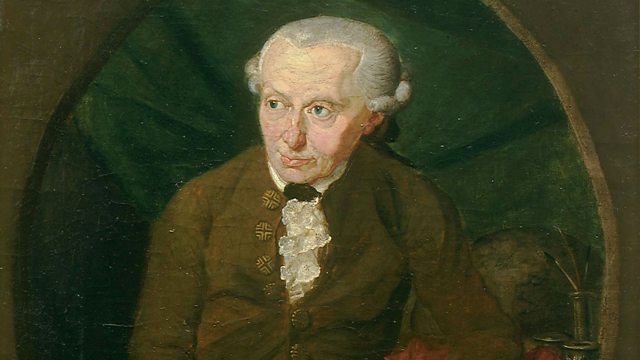Kant's Categorical Imperative
Melvyn Bragg and guests discuss one of Kant's best known ideas: 'Act only according to that maxim whereby you can, at the same time, will that it should become a universal law'.
Melvyn Bragg and guests discuss how, in the Enlightenment, Immanuel Kant (1724-1804) sought to define the difference between right and wrong by applying reason, looking at the intention behind actions rather than at consequences. He was inspired to find moral laws by natural philosophers such as Newton and Leibniz, who had used reason rather than emotion to analyse the world around them and had identified laws of nature. Kant argued that when someone was doing the right thing, that person was doing what was the universal law for everyone, a formulation that has been influential on moral philosophy ever since and is known as the Categorical Imperative. Arguably even more influential was one of his reformulations, echoed in The Universal Declaration of Human Rights, in which he asserted that humanity has a value of an entirely different kind from that placed on commodities. Kant argued that simply existing as a human being was valuable in itself, so that every human owed moral responsibilities to other humans and was owed responsibilities in turn.
With
Alison Hills
Professor of Philosophy at St John's College, Oxford
David Oderberg
Professor of Philosophy at the University of Reading
and
John Callanan
Senior Lecturer in Philosophy at King's College, London
Producer: Simon Tillotson.
Last on
LINKS AND FURTHER READING
Μύ
READING LIST:
P. Guyer, Kant’s Groundwork for the Metaphysics of Morals: A Reader’s Guide (Continuum, 2007)
Immanuel Kant (trans. Mary Gregor and Jens Timmerman), Groundwork of the Metaphysics of Morals (Cambridge University Press, 2012)
Christine Korsgaard, Creating the Kingdom of Ends (Cambridge University Press, 1996)
Roger Scruton, Kant: A Very Short Introduction (Oxford University Press, 2001)
Sally Sedgwick, Kant’s Groundwork of the Metaphysics of Morals: An Introduction (Cambridge University Press, 2008)
Roger J. Sullivan, An Introduction to Kant’s Ethics (Cambridge University Press, 1994)
Allen W. Wood, Kant (Blackwell, 2005)
Allen W. Wood, Kant’s Ethical Thought (Cambridge University Press, 1999)
Credits
| Role | Contributor |
|---|---|
| Presenter | Melvyn Bragg |
| Interviewed Guest | Alison Hills |
| Interviewed Guest | David Oderberg |
| Interviewed Guest | John Callanan |
| Producer | Simon Tillotson |
Broadcasts
- Thu 21 Sep 2017 09:00Βι¶ΉΤΌΕΔ Radio 4
- Thu 21 Sep 2017 21:30Βι¶ΉΤΌΕΔ Radio 4
Featured in...
![]()
Enlightenment—In Our Time
Browse the Enlightenment era within the In Our Time archive.
![]()
18th Century—In Our Time
Browse the 18th Century era within the In Our Time archive.
![]()
Philosophy—In Our Time
From Altruism to Wittgenstein, philosophers, theories and key themes.
In Our Time podcasts
Download programmes from the huge In Our Time archive.
The In Our Time Listeners' Top 10
If you’re new to In Our Time, this is a good place to start.
Arts and Ideas podcast
Download the best of Radio 3's Free Thinking programme.
Podcast
-
![]()
In Our Time
Melvyn Bragg and guests discuss the ideas, people and events that have shaped our world.



